高中英语:Unit-2-Language-Grammar疑问词引导的名词性从句课件-(牛津译林版必修3) (共32张PPT)
unit2 名词性从句
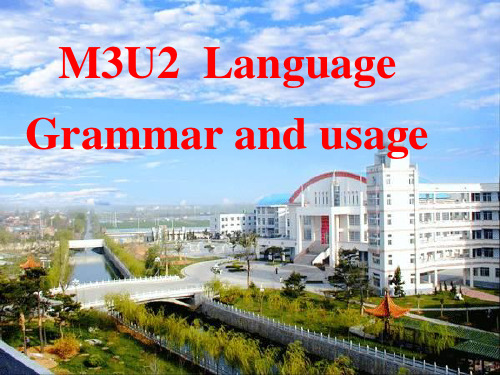
他是怎么成功的仍然是个谜。 How was he successful is still a puzzle.( F ) T How he was successful is still a puzzle. ( 你能告诉我他住在什么地方吗? ) Could you tell me where he lives? (T ) Could you tell me where does he live? ( F )
Grammar and usage
(2) Preparatory subject it
Review the function of “it”
1. It’s a gift from my husband. 指示代词 2. It’s the eighth of March. time 3. It’s raining outside. weather 4. It’s a long way to the USA.
whatever,whoever,既可以引导名词性从句,又可 以引导让步状语从句,引导让步状语从句时=no mater what,no matter who
1)Mothers will give their children whatever they have. 名词性从句
让步状语从句
2)Whatever mothers have, they will
总结:
名词性 从句, ①疑问词 + ever可引导_______ 在从句中要充当一定的成分。 让步状语 从句。 ②疑问词 + ever还可引导_______
让步状语 从句 ③no matter + 疑问词只能引导_______
1)Sarah hopes to become a friend of ________ shares her interests.
名词性从句知识清单-高三英语二轮专题

名词性从句的用法〔Noun Clauses〕Step1: 名词性从句的种类为4种:〔1〕主语从句.〔2〕宾语从句.〔3〕表语从句.〔4〕同位语从句.一. 主语从句的用法特点:相当于名词的功能,在复合句中作主句的主语.(一)由“that〞引导的主语从句.特点:〔1〕“that〞没有实在意义.〔2〕不行省略.〔3〕后接完整的句子,共同作主语,谓语动词用单数. 〔4〕也可用“it〞作形式主语,而把主语从句放在句末.E g:That the earth goes round the sun is known to all of us.主语系动词表语译文:地球围着太阳转是众所周知的.E g:It’s great that you got a scholarship真正主语译文:你拿了奖学金真是太好了.(二)由“whether〞引导的主语从句.特点:〔1〕“whether〞有意义, 表示“是否〞.〔2〕不行省略.〔3〕后接完整的句子,共同作主语,谓语动词用单数. 〔4〕往往和“or not〞连接. 〔5〕也可用“it〞作形式主语,而把主语从句放在句末.E g:Whether he will e or not is unknown主语译文:他来不来还不知道.E g:Whether he can help me or not doesn’t matter too much.主语=It doesn’t matter too much w hether he can help me or not译文:他是否要关心我关系不大/无关紧要.(三)由“特别疑问词代词和疑问副词〞引导的主语从句.1,疑问代词“what〞引导的主语从句特点:〔1〕“what〞有意义, 表示“什么〞.〔2〕不行省略.〔3〕后接完整的句子,共同作主语,谓语动词用单数. 〔4〕“what〞在从句中作及物动词的宾语,或者在从句中作主语.E g:What I told you is between you and me.主语译文:我告知你的是个隐秘.E g:What’s important is that one strives to achieve a goal.主语译文:重要的是为到达目标而不懈努力.E g:What bothers me is that I have no time.主语译文:让我困扰的是我没有时间.2,疑问代词“whatever〞引导的主语从句特点:〔1〕“whatever〞有意义, 表示“无论什么〞.〔2〕不行省略.〔3〕后接完整的句子,共同作主语,谓语动词用单数. 〔4〕“whatever〞在从句中作及物动词的宾语,或者在从句中作主语.E g:Whatever is worth doing at all is worth doing well.主语译文:任何值得做的事情都值得把它做好.E g:Whatever he said is true.主语译文:他说的任何话都是真的.3,疑问代词“whoever〞引导的主语从句特点:〔1〕“whoever〞有意义, 表示“无论谁/任何人〞.〔2〕不行省略.〔3〕后接完整的句子,共同作主语,谓语动词用单数. 〔4〕“whoever〞在从句中作作主语.E g:Whoever makes such a mistake should be punished.主语译文:凡犯此错的人都应受到惩处.E g:Whoever wants to reach a distant goal must take many small steps.主语译文:不管是谁,要到达远期目标,都必需一步一步往前走.4,疑问代词“where/wherever〞引导的主语从句特点:〔1〕“wherever〞有意义, 表示“无论哪里〞.〔2〕不行省略.〔3〕后接完整的句子,共同作主语,谓语动词用单数. 〔4〕“wherever〞在从句中作作状语.E g: Where we are going to spend the weekend hasn’t been decided yet.主语译文:我们准备去那里过周末还没有打算呢.二.表语从句的用法特点:相当于名词的功能,在复合句中作主句的表语,位于主句的系动词之后.(一)由“that〞引导的表语从句.特点:〔1〕“that〞没有实在意义.〔2〕不行省略.〔3〕后接完整的句子,共同作表语.E g:My biggest problem is that I can’t municate with others freely.主语系动词表语从句译文:我最大的问题就是无法与别人自由沟通.(二)由“whether〞引导的表语从句.特点:〔1〕“whether〞有意义,表示“是否〞.〔2〕不行省略.〔3〕后接完整的句子,共同作表语.E g: What our parents are worried about is whether we will be able to build a better future主语系动词表语从句译文:我们父母所担忧的是我们是否能够创立一个美妙的将来.(三)由“特别疑问词代词和疑问副词〞引导的表语从句.1,疑问代词“what〞引导的主语从句特点:〔1〕“what〞有意义, 表示“什么〞.〔2〕不行省略.〔3〕后接完整的句子,共同作表语,谓语动词用单数. 〔4〕“what〞在从句中作及物动词的宾语,或者在从句中作主语.E g:Luck is what happens when preparation meets opportunity.表语从句译文:幸运就是当一个做好预备的人遇到了时机.E g:Dreams are what you hope for ; reality is what you plan for.表语从句表语从句译文:幻想是的追求,现实是你的方案.2,疑问代词“whatever〞引导的主表从句特点:〔1〕“whatever〞有意义, 表示“无论什么〞.〔2〕不行省略.〔3〕后接完整的句子,共同作表语. 〔4〕“whatever〞在从句中作及物动词的宾语,或者在从句中作主语.E g: The main problem is whatever he has done主语表语从句译文:主要问题是他究竟做了什么事情.3,疑问代词“who/whoever〞引导的表语从句特点:〔1〕“whoever〞有意义, 表示“无论谁/任何人〞.〔2〕不行省略.〔3〕后接完整的句子,共同作表语,谓语动词用单数. 〔4〕“whoever〞在从句中作作主语.E g: The main problem is who can take his place. He really is one of a kind主语表语从句译文:主要问题是谁能取代他的位置. 他真的是独一无二的.4,疑问副词“where/wherever〞引导的表语从句特点:〔1〕“wherever〞有意义, 表示“无论那里〞.〔2〕不行省略.〔3〕后接完整的句子,共同作表语.〔4〕“wherever〞在从句中作状语.E g: The main problem is where we can find a hotel now.主语表语从句译文:主要问题是现在我们到那里去找旅馆.5,疑问副词“how〞引导的表语从句特点:〔1〕“how〞有意义, 表示“无论如何〞.〔2〕不行省略.〔3〕后接完整的句子,共同作表语. 〔4〕“how〞在从句中作方式状语.E g: The main problem is how we can solve such a tough problem.主语表语从句译文:主要问题是我们如何才能解决这个麻烦的问题.三.宾语从句的用法特点:相当于名词的功能,在复合句中作主句的宾语,位于主句的及物动词之后.(一)由“that〞引导的宾语从句.特点:〔1〕“that〞没有实在意义.〔2〕可省略.〔3〕后接完整的句子,共同作宾语.E g: I think(that) this food is out of this world主语及物动词宾语从句译文:我认为这道菜真是一绝.〔二〕“if〞引导宾语从句的特点:〔1〕“if〞有含义,表示“是否〞.〔2〕不行省略.E g: I just wonder / if / she can /e to my birthday party/ tonight.主语状语谓语引导词宾语从句译文:我只是想知道今晚她是否来参与我的生日宴会.留意:“If〞引导的宾语从句的用法与“whether〞引导的宾语从句的用法的两点区分. 〔1〕假设句末没有消失“or not〞, 两者可以互换.〔2〕假设句末消失“or not〞, 只能用“whether〞.E g: I don’t know / if/ whether / my parents can/ e to the class meeting.〔两者皆可〕主句引导词宾语从句比拟:I don’t know whether my parents can e to the class meeting or not.〔只能用“whether〞〕.〔三〕由疑问词引导的宾语从句.1, 由“what〞引导的宾语从句特点:〔1〕“what〞有实在意义,表示“什么〞.〔2〕不行省略.〔3〕后接完整的句子,可以在宾语从句中作主语和宾语.E g: Y ou never know what you can do till you try主语及物动词宾语从句译文:假如不去尝试,你永久也不知道自己能做什么.E g: We never know what will happen to us in the distant future主语及物动词宾语从句译文:我们永久也不知道在遥远的将来究竟发生什么状况.2 ,由“when〞引导的宾语从句特点:〔1〕“when〞有实在意义,表示“何时〞.〔2〕不行省略.〔3〕后接完整的句子,可以在宾语从句中作时间状语.E g: The stranger doesn’t know when the ship arrives主语及物动词宾语从句译文:谋生人不知道轮船何时到达.3 ,由“where〞引导的宾语从句特点:〔1〕“where〞有实在意义,表示“何处〞.〔2〕不行省略.〔3〕后接完整的句子,可以在宾语从句中作地点状语.E g: Could you please tell me where the nearest post office is?宾语从句译文:请你告知告知我最近的邮局在哪里吗?4,由“why〞引导的宾语从句特点:〔1〕“why〞有实在意义,表示“为什么〞.〔2〕不行省略.〔3〕后接完整的句子,可以在宾语从句中作缘由状语.E g: I didn’t understand why my boss was angry with me yesterday宾语从句译文:我不明白老板为什么昨天生我的气.5,由“how〞引导的宾语从句特点:〔1〕“how〞有实在意义,表示“如何〞.〔2〕不行省略.〔3〕后接完整的句子,可以在宾语从句中作方式状语.E g: I don’t know how I can e up with such a good idea宾语从句译文:我不知道如何才能想出一个好的办法.6,由“who〞引导的宾语从句特点:〔1〕“who〞有实在意义,表示“谁〞.〔2〕不行省略.〔3〕后接完整的句子,可以在宾语从句中作主语.E g: Could you tell me who is in charge of sales department?宾语从句译文:我不知道如何才能想出一个好的办法.7,由“whom〞引导的宾语从句特点:〔1〕“whom〞有实在意义,表示“谁〞.〔2〕不行省略.〔3〕后接完整的句子,可以在宾语从句中作宾语.E g: He asked me whom I was waiting for宾语从句译文:他问我在等待谁.8,由“whose〞引导的宾语从句特点:〔1〕“whose〞有实在意义,表示“谁的〞.〔2〕不行省略.〔3〕后接完整的句子,可以在宾语从句中作定语.E g: I can’t decide whose advice I should take宾语从句译文:我打算不了我应当实行谁的意见.9,由“which〞引导的宾语从句特点:〔1〕“which〞有实在意义,表示“哪一个、哪一些〞.〔2〕不行省略.〔3〕后接完整的句子,可以在宾语从句中作定语.E g: Please tell me which class you are in宾语从句译文:请告知我你在哪个班级.〔四〕.宾语从句语序的用法.特点:假设主句为一般疑问句,宾语从句的肯定要用正常语序,也就是宾语从句的情态动词、系动词、助动词不能放在从句的主语前.E g: Can tell me if/whether I have the flu?宾语从句译文:你能不能告知我我是不是得了流感?E g: Do you know where my mother went?宾语从句译文:你知道我妈妈去了哪里了吗?E g: Do you by any chance know why I was fired?宾语从句译文:你是否刚好知道我为什么被炒鱿鱼?〔五〕.宾语从句否认转移的用法.特点:在感知动词,即:“think/believe/suppose/expect〞等动词引导的宾语从句中,从句谓语动词尽管是否认意思,而把否认词转移到主句的谓语动词前.E g: I don’t believe you can finish the project alone宾语从句译文:我信任你一个人无法完成这个工程.E g: I don’t think you are right宾语从句译文:我想你不对.四.同位语从句的用法定义:用作同位语的从句叫做同位语从句。
名词性从句

“It” is used as empty subject
形式 主语
为避免主语冗长,句子头重脚轻,经常用it 作形式主语,主语从句放在后面作真正的 主语. 1.It is certain that he will succeed. 2.It is not known whether he will go there. 3.It has not been decided yet when they’ll start the project.
三.表语从句: 1.位于系动词be, look, seem, remain后。 结构为:主语 + 系动词 + that从句。
That is why I was late .
The reason (why … )is that … 原因是…
2.表语从句有时用because引导,It is because … 因
四.同位语从句
一般要放在某些抽象名词的后面,对名词进一步解释, 说明名词的具体内容, 一般由that引导或用连接副词when / where/why / how / whether , 可跟同位语从句的名词主要有: fact, truth ; problem ,news, promise, reason, idea, hope, word, belief, information,thought等。
请你归纳
请你归纳
whether和if都可以引导宾语从句
只能使用whether 的情况:
a. 主语从句位于句首时 b. 表语从句 c. 同位语从句 d. 介词后的宾语从句 e. whether (to do)
f
whether or not
1.Whatever was said here must be kept secret. 2.What we need is more time. 3. Who has taken away my bag is unknown. 4. Whoever breaks the law will be punished
Unit+2+Grammar+and+usage+课件-高中英语牛津译林版选择性必修第一册+

有一些动词短语也常跟动词-ing形式作宾语,如: insist on (坚持), object to (反对), be good at, lead to, leave off (停 止), put off (推迟), give up, look forward to , feel like(想要), devote to (把......奉献给),get used to (习惯于), pay attention to, can't help (禁不住), can't stand (受不了)等。
在他的国家,询问女士的年龄是不礼貌的
动词-ing 形式作主语
>1.动词 -ing 形式直接置于句首主语的位置上
Saying is easier than doing.
说比做容易。 2.动词-ing形式作主语时常后置,此时须用it 作形式主语,用形容词或名词(短语)作表语。
no useL,onreomgIoposudm, fun, hard work, a hard/difficult job 源自 a waste of time 等。
2.既可接动词-ing形式又可接不定式(短语)作宾语的动词:
begin, start, continue, like, dislike, love, prefer, mean , forget , remember , hate , regret 等。 (1)在 like, love, hate, prefer 等动词之后,用动词 -ing 形式或不定式意义上没有什么不同,只是侧重点有些不同,动词-ing形式表示 泛指的动作,不定式表示具体的一次性动作。 (2)在 begin, start, continue 之后,用动词 -ing 形式和不定式,意义无区别,尤其是 当主语是人的时候。
2019年1819 Unit 2 Section Ⅲ Grammar——名词性从句Ⅱ与it作形式主语语文
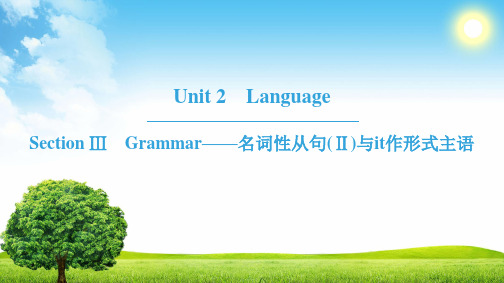
点
拨
返 首 页
语
境
自
主
二、it 用作形式主语
领
悟
当不定式、动名词、从句等用作主语时,为避免头重脚轻,通常在句首使
随 堂
效
用形式主语 it,而把真正的主语放在句子末尾。
果 落
语 法
1.代替主语从句
实
精
要
it 代替主语从句的常用句式如下:
点
拨
返 首 页
语
境 自
(1)It be+名词(a pity, a shame, an honour, a good idea, a miracle, a fact,
果
分,这时 what 具有两个含义:
语
落 实
法 精
①保留疑问的意义,即“什么;什么样的”;
要
点 拨
②相当于“the thing(s) that/which”,即“先行词+定语从句”的含义。
返 首 页
语
另外,what 的此种用法还可以表示时间(the time that)、地点(the place that)、
He didn't attend the meeting.That was because he was ill.他没出席会议。那是
因为他生病了。
返 首 页
语
境
自
主
(4)同位语从句
领
悟
随
I have no idea where he has gone.
堂
效
我不知道他去哪里了。
果
落
语 法
We don't understand the problem why this is the best choice.我们不明白这个 实
高中英语真题-Unit2Language_8
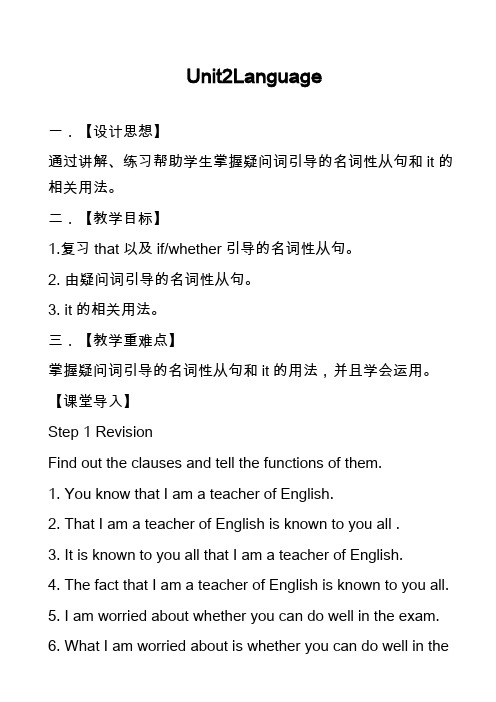
Unit2Language一.【设计思想】通过讲解、练习帮助学生掌握疑问词引导的名词性从句和it 的相关用法。
二.【教学目标】1.复习that以及if/whether引导的名词性从句。
2. 由疑问词引导的名词性从句。
3. it的相关用法。
三.【教学重难点】掌握疑问词引导的名词性从句和it的用法,并且学会运用。
【课堂导入】Step 1 RevisionFind out the clauses and tell the functions of them.1. You know that I am a teacher of English.2. That I am a teacher of English is known to you all .3. It is known to you all that I am a teacher of English.4. The fact that I am a teacher of English is known to you all.5. I am worried about whether you can do well in the exam.6. What I am worried about is whether you can do well in theexam.Step 2 Noun clauses introduced by question wordsJoin each pair of sentences1. Where does a person come from? This will affect their sty le of speech.2. Why does English have such strange rules? You can begi n to see it!3. Why does English have so many difficult rules that confuse people? That is the reason.4. How did Peter respond to that question? I have no idea.总结______________________________________________________ ______________________________________________________ ______________________________________________________ ______________________________________________________ _____________________Step 3 Other important cases of noun clausesI. that 与 what①_______caused the accident is a complete mystery .②He said ______ he couldn’t tell you the result right away and _____ you wouldn’t get it until the next day.③I was shocked by the news, making me realize _______ terri ble problems we would face.④______ he was worried about was finally solved easily.⑤ However, many people couldn’t believe ___________ he had written was true.⑥ I have no idea _____ he did that afternoon.⑦The reason lies in ______ she works harder than the others do.总结:______________________________________________________ __________________________________________________________________________ _________________________II. What 与 whatever1.--- Could you do me a favor?--- It depends on ______ it is.A. whichB. whicheverC. whatD. whatever2. The poor young man is ready to accept ______ help he can get.A. whicheverB. whatC. whateverD. whomever3. _____ he said at the meeting astonished everybody present .A. ThatB. WhateverC. WhenD. What总结:______________________________________________________ __________________________________________________________________________ _________________________III. Who与whoever/whomever1. _____ broke the window is unknown.2. ________ breaks the law will be punished.3. You can turn to __________ you trust.4. Leave the job to _________is fit to do it.Step 4 The usage of it1. I’d appreciate _____ if you would like to teach me how to use the computer.A. thatB. itC. thisD. you2. _____ is known to all that water freezes and ice forms at 0℃.A. ASB. WhatC. ItD. That3. It was not until I came here _____ I realized this place was f amous for not only its beauty but also its weather.A. whoB. thatC. whereD. before总结______________________________________________________ ______________________________________________________ ______________________________________________________ ______________________________________________________ _____________________【课堂巩固】一.关联词填空。
Unit 2 Grammar and usage课件-高中英语牛津译林版(2020)选择性必修第一册

try doing sth 试着做某事 try to do sth 尽力去做某事
a. Why not try doing it in some other way? 为什么不用其他办法试一试呢?
b. I tried to solve the problem but I couldn’t. 我努力解答那个题,但我解不出。
proud.
宾语
主语
V-ing
V-ing
A Below is a story about a musician and his friend in ancient China.
When Who What happened
When Who
• in China’s (1)S_p_r_in_g__a_n_d_A__u_tu_m__n_a_n_d_W__a_r_ri_n_g_S__ta_t_es period
① Do you like reading? 你喜欢看书吗? I like to read detective stories. 我喜欢看侦探小说。
② I hate asking favors. 我不愿意求人帮忙。 He would hate to disappoint you. 他不愿意让你失望。
a. I will never forget hearing her singing that song. 我将不会忘记听过她唱那支歌的情景。
b. I have forgotten to bring my umbrella. 我忘了带伞。
remember doing sth 记得曾经做过某事(动作已发生) remember to do sth 记住去做某事(动作还没有发生)
(1) It is useless trying to argue with Shylock. 和夏洛克争辩是没有什么用的。
人教版高一英语必修2 名词性从句1.doc

名词性从句主备人方小艳审核人从句是相对于主句而言的,即它是从属于某一个主句,而不能单独作一个句子。
在英语中,主要有三大从句,即名词性从句(包括主语从句,宾语从句,表语从句,同位语从句)、形容词性从句(即定语从句)、副词性从句(即状语从句,包括时间、条件、结果、目的、原因、让步、地点、方式等)。
名词性从句一定义:名词性从句指的是在整个句了中起名词作用的从句。
这种从句可以做主语、宾语、表语、同位语等,所以这类从句包括主语从句、宾语从句、表语从句和同位语从句。
例如:What they are doing seems very important.(主语从句)他们在做的事似乎很重要。
My hope is that he will be the best student in the class. (表语从句)我的愿望是他能够成为班上最好的学生。
Nobody knows who he is.(宾语从句)大家都不知道他是谁。
I don't like the idea that money is everything.(同位语从句)我不喜欢金钱就是一切这一观点。
二如何区分各种名词性从句:先找主句的谓语,然后分析。
1谓语之前的从句叫主语从句;2谓语之后的从句按动词不同分为两种从句。
如果谓语是及物动词或相当于及物动词的短语动词,则其后的从句为宾语从句;3若谓语是系动词,则其后的从句为表语从句。
4在主句中某个名词后面的从句则为同位语从句。
(但名词后也可能是定语从句,注意分析)找出各句中的从句并指出是何种从句。
1.1don't know if I can do it.2.What he is doing seems very difficult.3.The important thing is how we can improve our studies.4.Mr Li always thinks of how he can do more for the people.5.The news that she was pretending to be sick was whispered fi-om one to another.6.That's what you are going to do first.7.It'll be decided at the class meeting who is to be the monitor of our class.8.When the sports meet is to be held is still under discussion.9.1was suiprised at what he said.10.He gave me the news that some Americans will visit our school tomorrow.三名词性从句的分类【宾语从句】:在复合句中作动词或介词宾语的从句叫做宾语从句。
高考名词性从句讲解、习题及答案
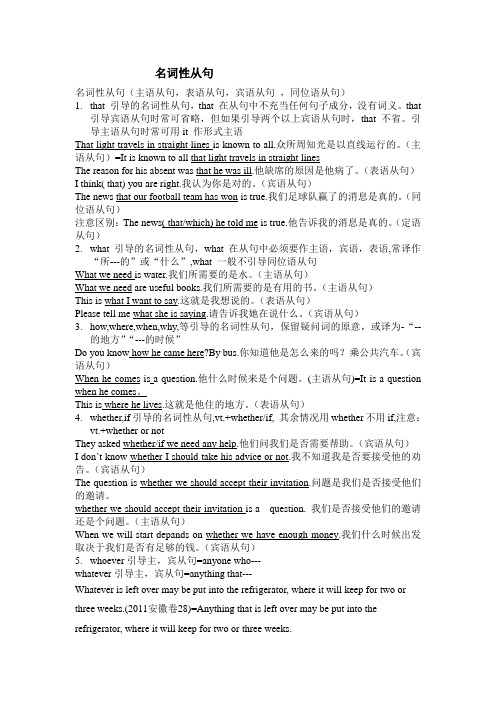
名词性从句名词性从句(主语从句,表语从句,宾语从句,同位语从句)1.that 引导的名词性从句,that 在从句中不充当任何句子成分,没有词义。
that引导宾语从句时常可省略,但如果引导两个以上宾语从句时,that不省。
引导主语从句时常可用it 作形式主语That light travels in straight lines is known to all.众所周知光是以直线运行的。
(主语从句)=It is known to all that light travels in straight linesThe reason for his absent was that he was ill.他缺席的原因是他病了。
(表语从句)I think( that) you are right.我认为你是对的。
(宾语从句)The news that our football team has won is true.我们足球队赢了的消息是真的。
(同位语从句)注意区别:The news( that/which) he told me is true.他告诉我的消息是真的。
(定语从句)2.what 引导的名词性从句,what 在从句中必须要作主语,宾语,表语,常译作“所---的”或“什么”,what 一般不引导同位语从句What we need is water.我们所需要的是水。
(主语从句)What we need are useful books.我们所需要的是有用的书。
(主语从句)This is what I want to say.这就是我想说的。
(表语从句)Please tell me what she is saying.请告诉我她在说什么。
(宾语从句)3.how,where,when,why,等引导的名词性从句,保留疑问词的原意,或译为-“--的地方”“---的时候”Do you know how he came here?By bus.你知道他是怎么来的吗?乘公共汽车。
译林版高中英语必修3讲义Unit 2 Section Ⅲ Grammar——名词性从句(Ⅱ)与it作形式主语
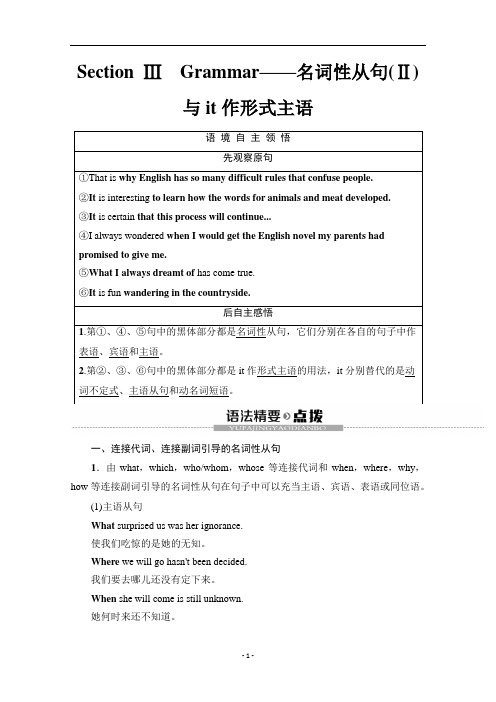
Section ⅢGrammar——名词性从句(Ⅱ)与it作形式主语语境自主领悟先观察原句①That is why English has so many difficult rules that confuse people.②It is interesting to learn how the words for animals and meat developed.③It is certain that this process will continue...④I always wondered when I would get the English novel my parents had promised to give me.⑤What I always dreamt of has come true.⑥It is fun wandering in the countryside.后自主感悟1.第①、④、⑤句中的黑体部分都是名词性从句,它们分别在各自的句子中作表语、宾语和主语。
2.第②、③、⑥句中的黑体部分都是it作形式主语的用法,it分别替代的是动词不定式、主语从句和动名词短语。
一、连接代词、连接副词引导的名词性从句1.由what,which,who/whom,whose等连接代词和when,where,why,how等连接副词引导的名词性从句在句子中可以充当主语、宾语、表语或同位语。
(1)主语从句What surprised us was her ignorance.使我们吃惊的是她的无知。
Where we will go hasn't been decided.我们要去哪儿还没有定下来。
When she will come is still unknown.她何时来还不知道。
(2)宾语从句The school was built on what used to be a wasteland.这所学校是在以前的荒地上建造的。
高中英语语法 名词性从句详解

宾语从句的语序
和其他词性从句一样,宾语从句必须使用陈述语序, 不能用疑问语序。
How can I get to the station? Can you tell me →Can you tell me how I can get to the station 你能 告诉我怎样去车站吗? What does he like? I wonder. →I wonder what he likes. 我想知道他喜欢什么。
Choose the right answer
1. I have no idea ____. a. what does this word mean b. what this word means c. what the meaning of this word d. what kind of a meaning is this word
because, why引导的表语从句
That‟s because he didn‟t understand me. 那是因为他没有理解我。(That„s because 强调原因) That‟s why he got angry with me. 那正 是他对我生气的原因。(That‟s why 强 调结果)
Define the following sentences
Exercise:
1. __ we shall be late is certain. a. when b. how c. why d. that 2. __ he says doesn‟t concern you. a. what b. how c. that d. which 3. It is not yet known __ he did. a. how b. that c. what d. when
高中英语名词性从句讲解与练习
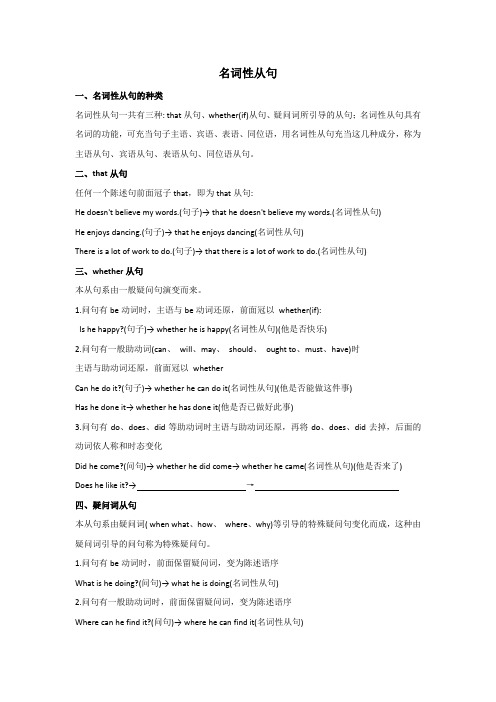
名词性从句一、名词性从句的种类名词性从句一共有三种: that从句、whether(if)从句、疑问词所引导的从句;名词性从句具有名词的功能,可充当句子主语、宾语、表语、同位语,用名词性从句充当这几种成分,称为主语从句、宾语从句、表语从句、同位语从句。
二、that从句任何一个陈述句前面冠子that,即为that从句:He doesn't believe my words.(句子)→ that he doesn't believe my words.(名词性从句)He enjoys dancing.(句子)→ that he enjoys dancing(名词性从句)There is a lot of work to do.(句子)→ that there is a lot of work to do.(名词性从句)三、whether从句本从句系由一般疑问句演变而来。
1.问句有be动词时,主语与be动词还原,前面冠以whether(if):Is he happy?(句子)→ whether he is happy(名词性从句)(他是否快乐)2.问句有一般助动词(can、will、may、should、ought to、must、have)时主语与助动词还原,前面冠以whetherCan he do it?(句子)→ whether he can do it(名词性从句)(他是否能做这件事)Has he done it→ whether he has done it(他是否已做好此事)3.问句有do、does、did等助动词时主语与助动词还原,再将do、does、did去掉,后面的动词依人称和时态变化Did he come?(问句)→ whether he did come→ whether he came(名词性从句)(他是否来了) Does he like it?→→四、疑问词从句本从句系由疑问词( when what、how、where、why)等引导的特殊疑问句变化而成,这种由疑问词引导的问句称为特殊疑问句。
高中英语名词性从句 讲解与练习
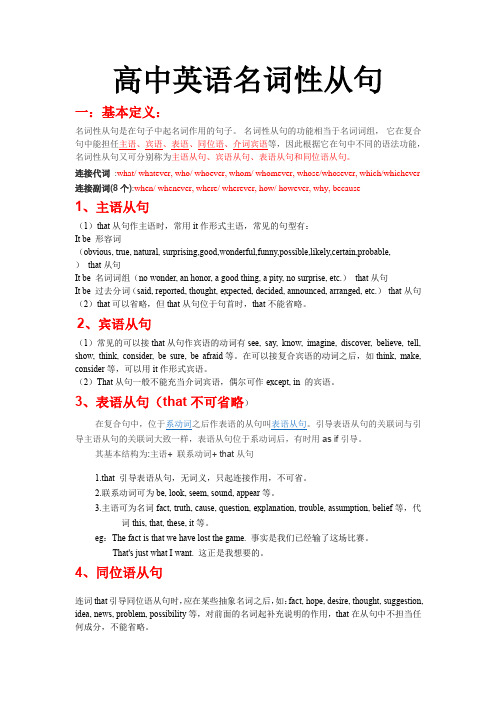
高中英语名词性从句一:基本定义:1、主语从句(1)that从句作主语时,常用it作形式主语,常见的句型有:It be 形容词(obvious, true, natural, surprising,good,wonderful,funny,possible,likely,certain,probable,)that从句It be 名词词组(no wonder, an honor, a good thing, a pity, no surprise, etc.)that从句It be 过去分词(said, reported, thought, expected, decided, announced, arranged, etc.)that从句(2)that可以省略,但that从句位于句首时,that不能省略。
2、宾语从句(1)常见的可以接that从句作宾语的动词有see, say, know, imagine, discover, believe, tell, show, think, consider, be sure, be afraid等。
在可以接复合宾语的动词之后,如think, make, consider等,可以用it作形式宾语。
(2)That从句一般不能充当介词宾语,偶尔可作except, in 的宾语。
3、表语从句(that不可省略)在复合句中,位于系动词之后作表语的从句叫表语从句。
引导表语从句的关联词与引导主语从句的关联词大致一样,表语从句位于系动词后,有时用as if引导。
其基本结构为:主语+ 联系动词+ that从句1.that 引导表语从句,无词义,只起连接作用,不可省。
2.联系动词可为be, look, seem, sound, appear等。
3.主语可为名词fact, truth, cause, question, explanation, trouble, assumption, belief等,代词this, that, these, it等。
高考英语技巧——依据句子成分和结构突破名词性从句

It is suggested that you (should) spend more time in studying English.建议你花更多的时间学习英语。
4.It+特殊动词或短语(seem, appear, happen, matter, turn out, occur to, make no difference等)+that从句
It suddenly occurred to her that Joe was afraid of beingalone.她突然想到乔害怕独自一个人待着。
解析:whoever 句意:这块金牌将颁发给在这场自行车比 赛中获得第一名的人。从句中缺少主语且表示“人”,因此 填whoever引导宾语从句并在从句中作主语。
[语法精析——知规则] 一、从属连词that, whether与if引导的名词性从句 (一)that引导的名词性从句 that引导名词性从句时本身无意义,只起连接作用,也 不在句中作任何成分。它引导的名词性从句结构和意义都完 整,往往用于陈述事实。在引导主语从句、表语从句和同位 语从句时,that不能省略。在引导宾语从句时,在口语和非 正式文体中,that可省略。但下列情况下,that不可省略:
解析:that 分析句子结构可知,设空处引导同位语从
句,解释说明evidence的内容,从句中不缺少成分且意义
完整,故填that。
2.(浙江 11 月高考)It is possible
caffeine may
名词性从句的功能与引导词
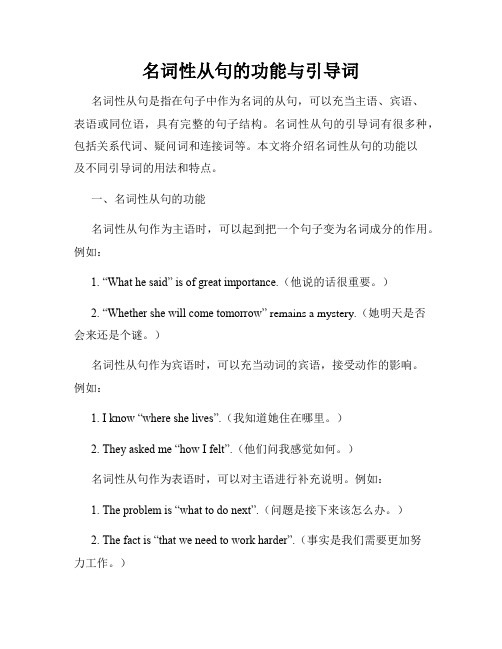
名词性从句的功能与引导词名词性从句是指在句子中作为名词的从句,可以充当主语、宾语、表语或同位语,具有完整的句子结构。
名词性从句的引导词有很多种,包括关系代词、疑问词和连接词等。
本文将介绍名词性从句的功能以及不同引导词的用法和特点。
一、名词性从句的功能名词性从句作为主语时,可以起到把一个句子变为名词成分的作用。
例如:1. “What he said” is of great importance.(他说的话很重要。
)2. “Whether she will come tomorrow” remains a mystery.(她明天是否会来还是个谜。
)名词性从句作为宾语时,可以充当动词的宾语,接受动作的影响。
例如:1. I know “where she lives”.(我知道她住在哪里。
)2. They asked me “how I felt”.(他们问我感觉如何。
)名词性从句作为表语时,可以对主语进行补充说明。
例如:1. The problem is “what to do next”.(问题是接下来该怎么办。
)2. The fact is “that we need to work harder”.(事实是我们需要更加努力工作。
)名词性从句作为同位语时,可以解释、说明或扩展前面名词所表示的内容。
例如:1. We are aware of “the fact that time is limited”.(我们意识到时间是有限的这个事实。
)2. His belief is “that honesty is the best policy”.(他的信念是诚实是最好的政策。
)二、名词性从句的引导词名词性从句的引导词可以分为关系代词、疑问词和连接词三类,不同的引导词用法和特点有所不同。
1. 关系代词关系代词用于引导名词性从句,并与先行词在句子中建立关系。
常见的关系代词有:that, who, whom, whose, which, what等。
高中英语:Unit-2-Language-Grammar疑问词引导的名词性从句课件-(牛津译林版必修

点拨拓展3:“缺什么补什么”
Fill in the blanks using conjunctions.
1.Tell me __w__h__icohne you like best.
2,__W__h_o_e_v_leeraves the room last ought to turn off the ligh ts.
My question ishow I can make a grammar lesson interesting.
predicative clause 表语从句
13
How did Peter respond to that question? I have no idea.
I have no idea how Peter responded to that question.
Unit 2 Language
• Grammar and usage
• 疑问词引导的名词性从句
1
Revision Find the clauses and tell the
function of them: 1. You know tthhaattIIaammaatteeaacchheerrooffEEnngglliisshh. OC
19
II.疑问词 + ever和no matter + 疑问词的区别: ①疑问词 + ever可引导名词性从句,在主从句中要充 当一定的部分。
Whoever breaks the rule must be punished. (whoever--anyone who) You can choose whatever you like in the shop. (whatever--anything that) ②疑问词 + ever还可引导让步状语从句。如: Whoever breaks the rule, he must be punished. Whatever you do, you must do it well. ③no matter + 疑问词只能引导让步状语从句。 No matter what you do, you must do it well. No matter who breaks the rule, he must be punished.
高考英语高中英语语法之【名词性从句】
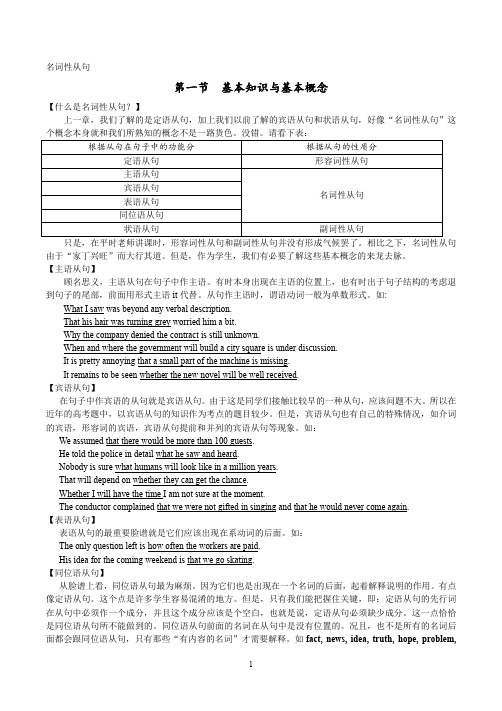
名词性从句第一节基本知识与基本概念【什么是名词性从句?】上一章,我们了解的是定语从句,加上我们以前了解的宾语从句和状语从句,好像“名词性从句”这个概念本身就和我们所熟知的概念不是一路货色。
没错。
请看下表:只是,在平时老师讲课时,形容词性从句和副词性从句并没有形成气候罢了。
相比之下,名词性从句由于“家丁兴旺”而大行其道。
但是,作为学生,我们有必要了解这些基本概念的来龙去脉。
【主语从句】顾名思义,主语从句在句子中作主语。
有时本身出现在主语的位置上,也有时出于句子结构的考虑退到句子的尾部,前面用形式主语it代替。
从句作主语时,谓语动词一般为单数形式。
如: What I saw was beyond any verbal description.That his hair was turning grey worried him a bit.Why the company denied the contract is still unknown.When and where the government will build a city square is under discussion.It is pretty annoying that a small part of the machine is missing.It remains to be seen whether the new novel will be well received.【宾语从句】在句子中作宾语的从句就是宾语从句。
由于这是同学们接触比较早的一种从句,应该问题不大。
所以在近年的高考题中,以宾语从句的知识作为考点的题目较少。
但是,宾语从句也有自己的特殊情况,如介词的宾语,形容词的宾语,宾语从句提前和并列的宾语从句等现象。
如:We assumed that there would be more than 100 guests.He told the police in detail what he saw and heard.Nobody is sure what humans will look like in a million years.That will depend on whether they can get the chance.Whether I will have the time I am not sure at the moment.The conductor complained that we were not gifted in singing and that he would never come again.【表语从句】表语从句的最重要脸谱就是它们应该出现在系动词的后面。
- 1、下载文档前请自行甄别文档内容的完整性,平台不提供额外的编辑、内容补充、找答案等附加服务。
- 2、"仅部分预览"的文档,不可在线预览部分如存在完整性等问题,可反馈申请退款(可完整预览的文档不适用该条件!)。
- 3、如文档侵犯您的权益,请联系客服反馈,我们会尽快为您处理(人工客服工作时间:9:00-18:30)。
A
4)The problem is who/ whom I should turn to for help. 5) Whoever leaves the room P last ought to turn off the lights. 6) When we will go skatingS is up to you to make a decision. 7) I insisted upon an answer Sto my question why he had done it. A 8) There is a doubt how they managed to travel to the moon.
Learning aims
1.To grasp the usage of noun clauses introduced by question words. 2. To apply the usage into practical exercises.
• Step one • Lead-in
Brainstorming: what words can be used as conjunctions to introduce noun clauses? 1. 从属连词:that ,whether /if (句子结构完整) 2. 连接代词:(9个) whom (whomever) ,who (whoever) , whose which (whichever) , whห้องสมุดไป่ตู้t(whatever) (从句中缺少主、宾、表、定语) 3. 连接副词:where, when, how, why (句子 主干部分完整但缺少状语)
subject clause 主语从句
What’s wrong with him?
I want to know.
I want to know what’s wrong with him. object clause 宾语从句
How can I make a grammar
Revision
名词性从句(Noun Clauses)
1.定义: 在句子中起名词作用的句子叫名词性从句 (). 名词性从句的功能相当于名词词组, 它在复 合句中能担任主语、宾语、表语、同位语、介
词宾语。
2.分类: subject clause object clause predictive clause apposition clause
Unit 2 Language
Grammar and usage
疑问词引导的名词性从句
Find the clauses and tell the function of them: that II am am a a teacher teacher of of English. English OC 1. You know that 2. That I am a teacher of English is known to you all . SC 3. It is known to you all that I am a teacher of English English. SC 4. The fact that I am a teacher of English is known to you all. AC 5. I am worried about whether you can do well in the exam. OC 6. What I am worried about is whether you can do well in the exam. SC PC
连接代词
连接副词
when, where, how, why
状语
Tips: as if ,as though 常用于表语从句
点拨拓展2:疑问词引导的名词性从句要 用陈述句语序。(疑问词+陈述句语序) Join the two sentences together.
What was he doing ? His father was surprised. ___________________surprised What he was doing his father.
主
宾
表
同
引导词 1) That 可 可(省) 可(省) 可 2) Whether 可 可 可 可 3) If 可(动宾) 3.从属连词:that,whether, if that 引导名词性从句时,只起连接作用,无意义, 不充当成分。 whether 引导名词性从句,不充当成分,有意义 表“是否”; 4. 名词性从句语序一律用陈述句语序。
Step 2 Presentation : Self-guidance 1 According to the exercise book, finish part1 on P51. Cooperation and Discussion 1 According to the exercise book on P52, analyze each sentence below in groups and tell which kind of noun clause it is. 1)What he said at the meeting confused everyone present. S gave him. 2)The little boy ate whatever his mother 3)Please give some suggestion which book I should choose among these. O
A
点拨拓展1: Conjunctions of Noun Clauses:
连接词
that, whether, if, as if 不做成分 (as though)
what, whatever, who, whoever, whichever whom, whomever , whose, which 主宾
